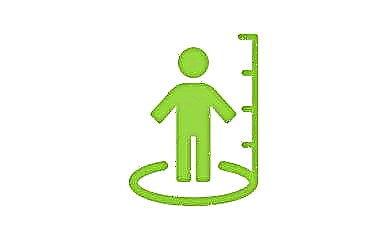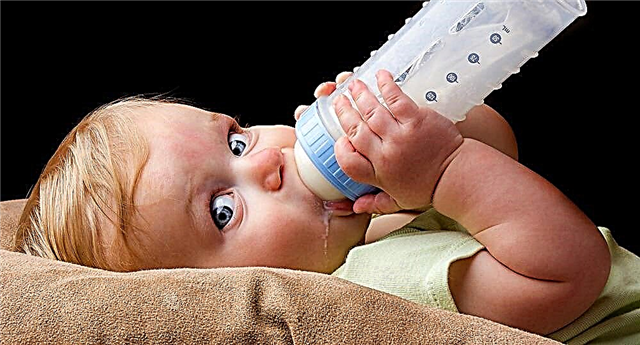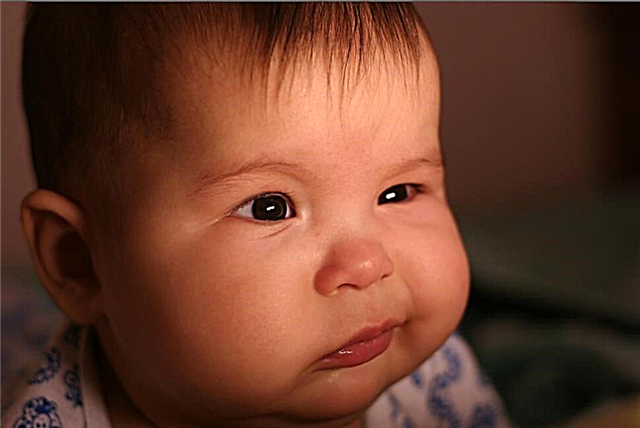Before analyzing the painful reasons why a child can cough, it is worth saying that a cough is not always a disease and does not always need to be treated. Sometimes a cough can be just a defensive reaction of the body. It is normal in everyday life. Cleans the respiratory tract from sputum and foreign bodies accumulating in them. Physiologically, such a cough is short-term, while there are no other symptoms of the disease.
Coughing becomes one of the first symptoms of a cold in a child. It represents the body's defenses aimed at cleansing the body of harmful bacteria. With the help of a cough, the mucus accumulated in the trachea and bronchi is released. In this case, the choice of the drug and the tactics of treatment depend on the nature of the cough and on how it changes during the development of the disease. After all, what is used for a wet cough is not always suitable for a dry one. And the reasons for the same dry cough are different.
Causes of dry cough
 If the cough is dry, then it does not bring any benefit, it only causes anxiety and pain. The reason for this cough is an infection in the upper respiratory tract that irritates the wall of the trachea or bronchi.
If the cough is dry, then it does not bring any benefit, it only causes anxiety and pain. The reason for this cough is an infection in the upper respiratory tract that irritates the wall of the trachea or bronchi.
In children of the first years of life, a dry cough is caused by an increase in the viscosity of sputum, impaired "sliding" of sputum through the bronchi, weak work of the muscles of the bronchi.
A dry cough usually occurs in the early days or in the early hours of the illness. More often this is typical for diseases such as acute respiratory infections, laryngitis, pharyngitis, pertussis infection, influenza, parainfluenza.
Also, the cause of dry cough can be bronchial asthma, neuroses, hypertrophy of the palatine tonsils, runny nose, pneumonia, bronchitis, foreign bodies in the respiratory organs, left ventricular heart failure, gastroesophageal reflux disease, allergies.
In the presence of a dry cough, the doctor finds out the connection of the cough with:
- Contact with a long-term coughing child
- Body position, time of day
- Eating, the presence of pathology of the gastrointestinal tract (regurgitation, for example).
- ENT organ pathology (postnasal leakage syndrome)
- Contact with allergens
- Physical activity, cold air
- Psycho-traumatic situations
How to distinguish an allergic cough from an infectious one?

If a dry cough is of an infectious nature, then there should be signs of infectious inflammation: acute onset, fever, deterioration. If the general condition is slightly disturbed, and the main problem is a cough, and the cough is prolonged, there was contact with something unusual, then most likely this cough is allergic.
Alarming symptoms with a dry cough
See a doctor immediately if:
- Paroxysmal cough. It arose suddenly during the day, while eating or while playing.
- The cough is rough, barking, worried about hoarseness, noisy, rapid breathing, shortness of breath.
- The temperature rises above 38.5 degrees for more than 3 days.
- There is a second wave of temperature after improvement, accompanied by increased cough, worsening of health, discharge of thick fetid sputum.
- Shortness of breath, frequent shallow breathing without fever, dry obsessive paroxysmal cough.
- The cough lasts more than 2-3 weeks.
Dry cough treatment principles
When treating cough, not everyone thinks about eliminating its true causes, paying attention first of all to eliminating annoying symptoms. It is worth remembering that cough is not a disease, but a symptom of a disease. The first step is to make a diagnosis and then determine a treatment plan.
A big mistake of parents is buying medicines on their own without a doctor's prescription. Improper treatment can aggravate the course of the disease. Dry and wet coughs require completely different medications.
When treating cough, it is necessary:
- Determine the source of the cough (posterior rhinitis, pharyngitis, laryngitis, irritation of the cough center)
- It is necessary not to cure a cough, but to increase its effectiveness.
Factors affecting the effectiveness of a cough:
- The strength of the cough push, the ability to cough deliberately, the strength of the respiratory muscles, the volume of air inhaled.
- Sputum quality (thick, thin)
Effective effect on phlegm:
An effective effect on phlegm is impossible without a sufficient amount of fluid you drink, clean humidified air in the bedroom, and restoration of bronchial patency!
- Drink plenty of fluids.
- Airing the room. The air temperature is about 20 degrees.
- Warmth on the chest.
- Air humidifier (steam inhalation). Humidity should be around 70%.
- Distracting procedures (mustard plasters, for example) - be careful !!
Medicines for the treatment of dry cough

Medicines can:
- Affect sputum rheology
- Improve the work of the ciliated epithelium
- Activate the contractile function of the bronchi
- Reduce the excitability of the cough center
- Reduce the sensitivity of nerve endings.
If a dry cough (especially in the first hours or days of the disease) does not greatly harm the child, does not cause problems, does not paroxysmal, does not reach vomiting, the child feels well, then it is advisable not to suppress such a cough. After all, if we prescribe antitussive drugs that act on the cough center in the brain, the child will stop coughing, in connection with which there will be an accumulation of pathogenic bacteria, foreign bodies, thereby the reason remains inside, the condition worsens. Cough medicines such as sinekod, codelac, stoptussin can be used only when the cough is ineffective, useless. For example, with whooping cough.
Another group of drugs is expectorant drugs and mucolytics, such as ambroxol, lazovlan, ambrobene, ACC. They increase the amount of mucus, the phlegm becomes thinner and easier to cough up.
But it should be remembered that the peculiarity of the child's body is that the respiratory muscles of children are much weaker than the muscles of adults, therefore it is more difficult for a child to cough up phlegm. Often, the child is unable to cough up the extra mucus produced by expectorant drugs.
Expectorants and antitussives should be prescribed by a doctor. Simultaneous administration of mucolytic and antitussive drugs is unacceptable. There are many herbal, refined products that are safe for the baby and can be used on their own. For example, plantain herbion, linkas, stodal.

The use of inhalation relieves cough well. There are inhalers that create coarse and fine solutions. Coarse aerosols act on the upper respiratory tract, fine aerosols work on the lower respiratory tract. Inhalers that can create fine solutions are called nebulizers. The steam inhaler creates a coarsely dispersed aerosol, therefore it is intended for the treatment of the upper respiratory tract (runny nose, pharyngitis, laryngitis).
Inhalations should be carried out on their own only with saline or alkaline solutions. The doctor should prescribe medication for inhalation. It is impossible to carry out inhalations at an elevated temperature in a child and in the presence of purulent diseases in a child, such as tonsillitis, sinusitis, sinusitis.
Massages, rubbing can be carried out in the absence of a child's temperature. Rubbing with ointment with aromatic oils, for example, Dr. Mom, it is possible if the child is over 2 years old, he does not have allergies and the baby is not sick with whooping cough. Drainage massage is indicated for bronchitis, it helps to better discharge phlegm.
How to relieve a dry cough that can lead to laryngospasm

Very often, especially in children under 5 years of age, a dry cough is a harbinger of beginning laryngitis. It is helpful for parents to know how to deal with this situation.
- Make the air in the room humid. It is often possible to relieve a coughing fit that is choking a child by simply turning on hot water in the tub and closing the door to let the child breathe that vapor.
- You can steam your feet if the child does not have a fever.
- Give your child more to drink to moisturize the mucous membrane.
- Use baby syrups. It is better to use natural, but it is necessary that the child is not allergic to their components.
- Inhalation with saline or with another drug that the doctor advises.
The main task of therapy is not to suppress a dry cough, but to help him move into a productive one. Comprehensive treatment aimed at the causes, mechanism, relief of symptoms of the disease, allows you to quickly get rid of cough. With the right treatment, you can get rid of a cough in 2 weeks, otherwise it can go into a protracted or chronic stage, and this is another treatment, which usually cannot be complete without an antibiotic.



